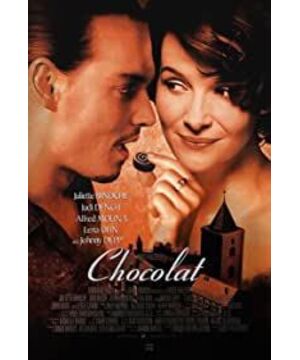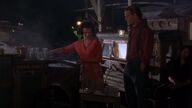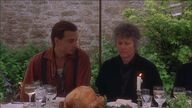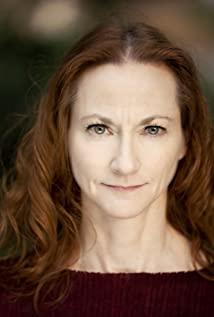From the very beginning, I knew that this would be a movie I like. It has the colors of the small town that I like, and has a quiet and harmonious atmosphere. It is a movie about the life of a minority. Their lives can be placed in any village in the world, in any era in history, because that life is real and self-sufficient.
The whole city is as peaceful as dawn and as quiet as twilight. Without special embellishments, it is a European town with a few people. People gather in the church, listen to sermons, and behave themselves. However, under the shroud of self-discipline, there is inner turmoil and free eyes. All behavior patterns are written, and just like history, they cannot be changed. However, this life was changed by the women in red cloaks who came along with the wind. It is worth mentioning that it is really a surprise to mix animation-like stunts in such a low-key and tender movie.
When Vivian appeared in the red cloak, she couldn't help but think of the last time she saw Binoche. She was still a young girl in "Love in Prague". Those who didn't watch the film would definitely be shocked by her youth, slightly reddened. Her face is full of innocence and cuteness, and it is hard to extricate herself from falling in love with her, even if she is stubborn and neurotic. When it came to "Chocolate", I had to admit that she was getting old. The still red face is mature and rational, serious and strong, less innocence but more rich in charm, still charming is her kind smile and honey-brown eyes. What came with Vivian is the passion for life and the vitality of art. All kinds of artworks, chocolate shapes, and red doorbells are placed in the green room, which gradually penetrated into the whole town, using her small universe. Infect everyone.
In fact, everything at the beginning of the film looked normal. People were friendly, humorous, and easy-going. Only when they believed in God's discipline and Vivian's freedom-loving atheism did they find that it was an irreconcilable contradiction and an irreversible confrontation.
She is mysterious, even more mysterious because of her cheerful enthusiasm. She is even more magical. She can accurately judge people's characters according to the small turntable and choose the right chocolate for them. Here, she uses different flavors to evoke different memories, different sentimentality, but the same happiness and inner smile. In the chocolate shop, everyone is real, and everyone confides their emotions in front of her, saying their truest thoughts and self.
The film uses a fairy tale-like approach, neither fast nor slow, and the storytelling is euphemistically.
The whole village seems to have vitality, but this vitality is hidden so deeply that no one dares to discover it. When the ice and snow melt on the statue and usher in the spring, the decay and the system are slowly melting, but the final victory still has to go through a holy war, a confrontation between the exterior and the mind. Everyone is changing, changing to what they dare not think, saying what they dare not say. In a place above God, someone said the classic words: "We are still husband and wife in the eyes of God." "Then God must be blind."
In fact, there is only one person in the whole town who is insisting, that is, the descendant of the statue, a devout believer, and the mayor who is deeply hidden. He tried to use God to change all people, but he didn't know that God's transformation could not stand the test, only real spiritual changes could become reality until the end.
I think what the film wants to show the most is not how Wei An fights with the mayor, fighting for the freedom of the people in the town, and what has changed. Instead, I wanted to express Vivian's own life. Her life is actually the same, wandering, helping others to be happy, and changing others, but she is the one who needs help and happiness the most. Wei An and her daughter are wandering in red cloaks, wearing red shoes that others dare not wear, doing things that others dare not do, and this freedom is indeed tightly bound, she is bound by her dead mother, Some people are bound by their natural pursuit of freedom. She is a strong and vulnerable person who has the courage to change others, but does not have the courage to change herself. In addition, she also implicated her lively and lovely daughter. The little girl repeats her life, unhappily. She hates the wandering life. People and things around her are always changing. Children living in turmoil can only rely on imagination. She imagined a kangaroo named Pandorf. The kangaroo living in the imaginary world is so real. The only thing that made her feel at ease. It was not until the end of the film that I knew why the youngest daughter always said that Pandorf had a leg problem and could not walk.
The love in the film is just an embellishment in weight, but it has a catalytic effect. It gave birth to love, catalyzed Wei An's change, and produced Wei An's happy life. The beginning and the end of the film are so coherent, similar. The same sermon, the content is different; the same sky, the atmosphere is different. There is no stray scene at the end of the film. When Vivian threw her mother's ashes into the air and drifted away with the wind, I knew that she would never leave again. The mother who bound her has continued to wander with the wind. Indeed, after freedom and happiness, the refreshment and release of the mind will relieve all those who follow the rules.
The whole film has the feeling of "Amelie", which is a movie that women will like very much. I like the music of the small town style, and the tempting chocolates of various colors. The props of the film are very good, simple, with strong characteristics of the times, and each set and decoration are exquisite and authentic. Especially enjoy the process of making chocolate, whether it is real or not, precise and always intoxicating. If I had to say something regretful, I didn't say what kind of chocolate Vivian likes. Could it be that this is a question left to the audience?
View more about Chocolat reviews











